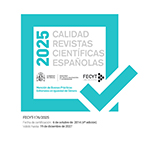Buenas prácticas y oportunidades de mejora en el acompañamiento socioeducativo con juventud en protección durante la transición a la vida adulta
Resumen
La juventud en protección se emancipa en un contexto de vulnerabilidad y con carencias de apoyo social. El acompañamiento socioeducativo que realizan los equipos profesionales es determinante para facilitar relaciones y espacios de seguridad. La intervención educativa facilita la consecución de las metas propias de la transición a la vida adulta. La presente investigación pretendió analizar buenas prácticas en el acompañamiento socioeducativo que permitan configurar un espacio educativo seguro desde el que la adolescencia en protección pueda asumir el proceso de transición a la vida adulta, así como definir líneas de mejora en el sistema de protección que faciliten que las estrategias eficaces puedan consolidarse y superar los obstáculos presentes. Se diseñó una investigación cualitativa, organizada en tres fases según la teoría fundamentada, mediante observación participante de casos (N=6), seguimientos longitudinales (N=11) y entrevistas con figuras profesionales (N=7). La muestra de jóvenes se configuró con once hombres y siete mujeres. Participaron siete educadoras sociales. En la fase uno se tomaron notas en un cuaderno de campo. En las fases dos y tres se realizaron un total de 62 entrevistas, siendo 55 con juventud egresada del sistema de protección y siete con figuras profesionales. Los resultados indicaron que las prácticas de los equipos educativos facilitaron espacios de referenciado profesional que favorecieron un escenario seguro desde el que los jóvenes asuman los extenuantes retos de la vida adulta. Se detectaron condicionantes burocráticos y organizativos del sistema de protección que dificultaron las intervenciones. La acción socioeducativa eficaz priorizó los tiempos de acompañamiento en espacios marcados por la cotidianidad de la vida diaria. Se concluyó que es preciso que los recursos residenciales adecuen la organización del trabajo a la perspectiva socioeducativa de los equipos profesionales.
Descargas
Descarga artículo
Licencia
La Revista Complutense de Educación, para fomentar el intercambio global del conocimiento, facilita el acceso sin restricciones a sus contenidos desde el momento de su publicación en la presente edición electrónica, y por eso es una revista de acceso abierto. Los originales publicados en esta revista son propiedad de la Universidad Complutense de Madrid y es obligatorio citar su procedencia en cualquier reproducción total o parcial. Todos los contenidos se distribuyen bajo una licencia de uso y distribución Creative Commons Reconocimiento 4.0 (CC BY 4.0). Esta circunstancia ha de hacerse constar expresamente de esta forma cuando sea necesario. Puede consultar la versión informativa y el texto legal de la licencia.











